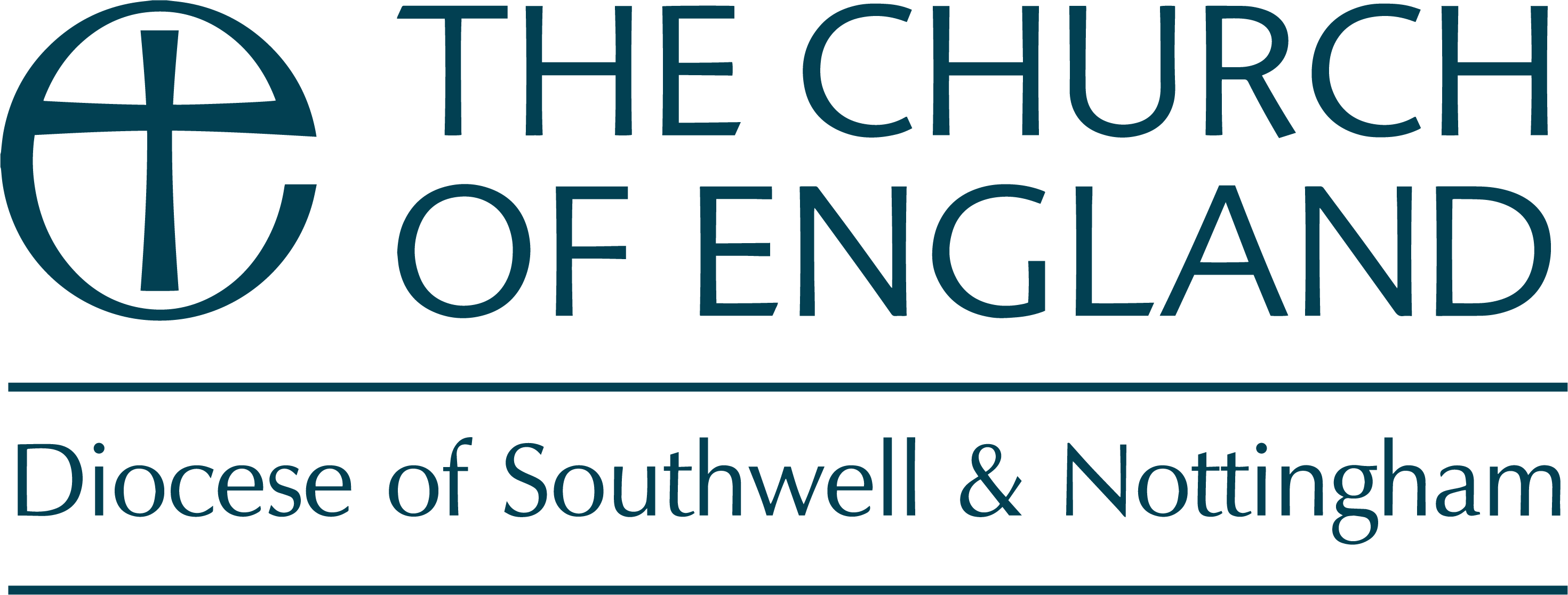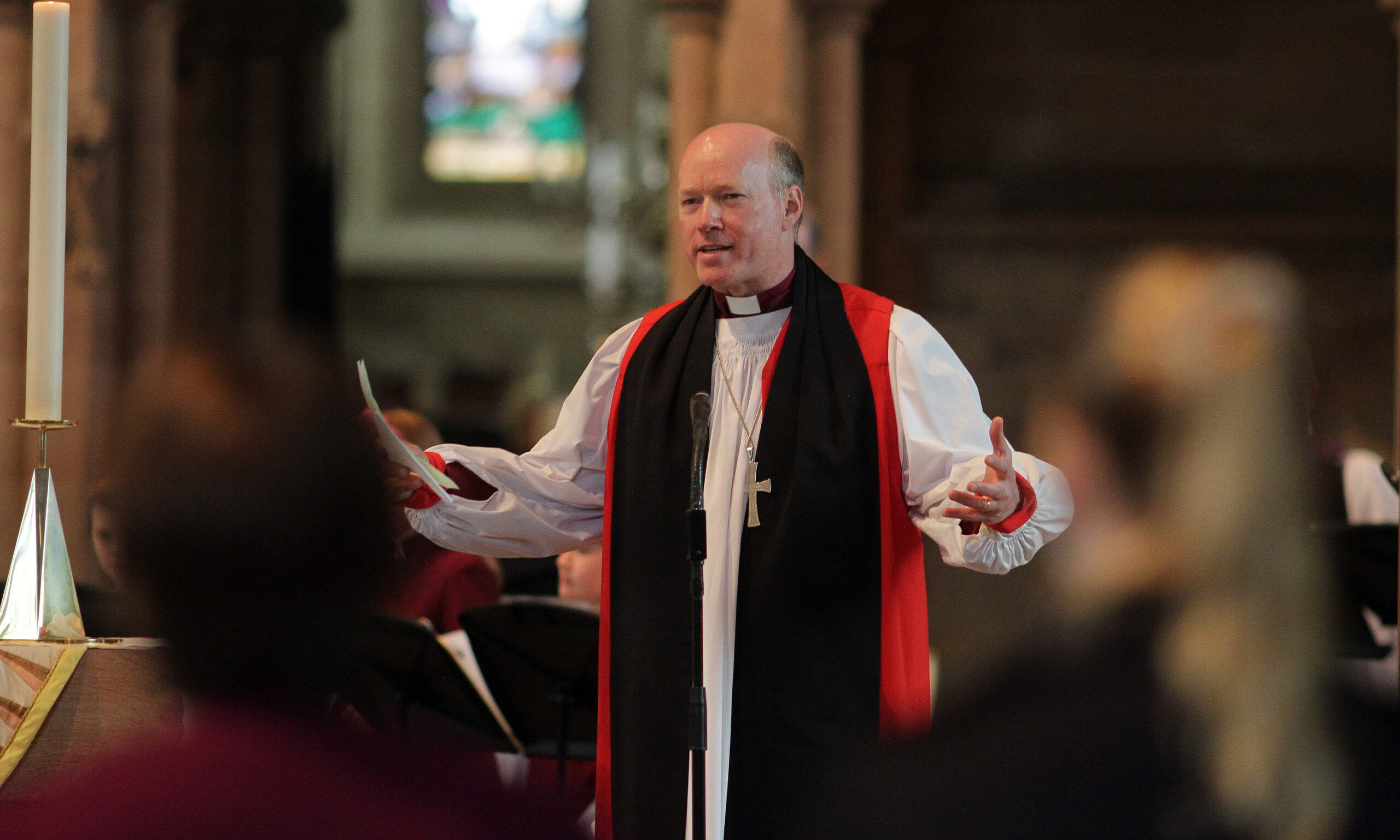Bishop’s Address to Diocesan Synod
Saturday 13th May 2023
The Southwell and Nottingham Diocesan Synod met on 13th May 2023 in Holy Trinity Church, Southwell. As a body of representatives of clergy and lay people from across the deaneries, the Diocesan Synod usually meets biannually along with the bishops, archdeacons, diocesan members on General Synod and other senior post holders in the diocese, seeking to work collaboratively to move forward the mission of the Church. Bishop Paul addressed the Diocesan Synod and you can read a transcript of his address below:
“In my Address to this Synod I want to touch on three things: firstly, the extraordinary privilege of participating in the mission of God and his great purposes for his Church; secondly, how this relates to the task of refreshing the Diocesan Vision, Strategy and Resource planning looking to 2030 and beyond: then thirdly, to share some thoughts and outlook on the next steps with the Living in Life and Faith journey for the Church of England. (There will be a chance shortly to use Agenda Item 12 to offer any questions or share further reflections you might have on LLF).
I want to start with the extraordinary privilege of the calling we share.
In 1 Peter 1, the apostle writes, “Praise be to the God and Father of our Lord Jesus Christ! In his great mercy he has given us new birth into a living hope through the resurrection of Jesus Christ from the dead.”
Tim Keller, who is a theological teacher and very insightful reader of culture, in his (2021)book ‘Hope in Times of Fear’ – Resurrection and the Meaning of Easter, writes this: “By the middle of the first decade of the twenty-first century the numbers of people believing in a better life for their children began to decline. Pessimism about the future for our society has only deepened over the past fifteen or twenty years, as a variety of polls and surveys show.”
Quoting an influential social commentator, he goes on to say, “There are many reasons…for the increasing sense of anxiety and hopelessness characterising our age. As we have slowly and surely attained more progress, we have lost something that undergirds all of it: meaning, cohesion, and a different deeper kind of happiness than merely satisfying all our earthly needs.”
Keller writes, “The greatest threat to our hope for a better world is not the natural environment but the various evils that continually spring from the human heart…” along with the absence of being able to see the purpose of life in relation to a larger story, the cosmic story, the story of eternity.
This sense of ‘a different and deeper kind of happiness’was expressed so well by someone I spoke with this past week who told me they had recently been to a church service for the first time in a very long while, and told me that the whole experience, especially the worship and the bible message, felt to them like being plugged into a spiritual recharge on a deep level, connecting with something much bigger than they’d imagined, and they went away wanting more.
It is not that Christians find an easier way of doing life in a complex and frequently bruising world, but we have been given a living hope through the resurrection of Jesus Christ from the dead, and so we can learn to look on the circumstances of life quite differently. Our struggles and disappointments, our pain and suffering, our little triumphs and highest joys – none of this ultimately defines who we are because we see that our lives are drawn into an infinitely bigger story, in which Jesus is at the centre from start to finish. And we get to play a full part in this story not as a nameless person in the crowd, but someone known and dearly loved by God, empowered by the Spirit.
The challenge is we are too easily inclined to diminish the significance of God’s hope and that it is fundamentally important for everyone. It is not just something private and personal, which is why in chapter 3 of 1 Peter, the apostle says, “Always be prepared to give an answer to everyone who asks for the hope that you have. But do this with gentleness and respect…”
Showing gentleness and respect doesn’t mean we need lack any confidence in the hope of the gospel given to us to share. We can and should be very bold. And let’s be clear that this book (holding up a bible) is an immeasurable gift. One of the most striking moments in the coronation last Saturday was when the King was presented with a bible and told, “Receive this Book. The most valuable thing this world affords. Here is Wisdom; this is the royal Law; these are the lively Oracles of God.”
Here is a feast for the soul which we can invite others to experience.
On Christmas Eve this past year in the afternoon I went to one of our smaller villages in the north of the diocese. I had packed far too much into my diary that day and so was running a little behind when I arrived at the church with 20mins to go. As I walked into an already packed building, the churchwarden greeted me very warmly and led me towards the vestry.
As we made our way she said she thought I might like a cup of tea after the drive from Southwell. Knowing how little time I had to get ready for the service, I was about to politely decline, but at that moment I stepped into the small vestry and saw that it had been transformed into a delightful tea room. There was a fine table cloth, the best china tea cups and teapot, a stunning table decoration, and the most delicious looking home-made biscuits. And so, I said I would very much appreciate a cup of tea! For the next ten minutes I sat with the churchwarden and another church officer enjoying the feast set before us.
There was then only 5mins to get ready for the service and yet we still managed to start on time. But it struck me that the unexpected kindness and generosity I had just experienced was like a picture of the spiritual feast that was about to be set before the congregation. The numbers in church corresponded to a third of the population of the village, though this included some who were visiting family for Christmas. The service was full of joy and wonder. Afterwards someone said to me, ‘I didn’t know that church could be like this and your words really connected with some things going on in my life and I wasn’t expecting that.’
I have visited quite a few of our village churches over the past nine months and I have not come away from even one that is not laden with enormous missional potential to share the hope of Christ and make disciples, especially where they can be working in partnership with a local school.
I pray that every one of the churches of the diocese will continue to grow in confidence seeing more clearly the significance of what we are able to offer: which is a feast of hope available to all. We get to share this feast for the soul through our worship, our preaching, our prayers, our hospitality, through opportunities to explore faith in courses like Alpha, connecting in new ways with younger people, and those struggling with life or alone.
There is so much we can give thanks for already where churches in the city, towns and villages are finding fresh ways to share the hope of Jesus. I only wish there was time to share more of the stories of lives being changed. Yet far too many people living and growing up in Nottinghamshire are doing life without knowing they are dearly loved by God and they can have a sure and certain hope in Jesus.
The first Letter of Peter is not only full of God’s hope, there is also a solemn charge that is repeated on three occasions, first in chapter 1 v13: “Therefore, prepare your minds for action; and being sober-minded, set your hope fully on the grace that Jesus Christ will bring you when he is revealed.”
On a personal level this means we should think and pray carefully over what it may mean for us to play our part in sharing the hope of Christ during this next season of life, whatever its unique challenges or opportunities happen to be. The Holy Spirit is on the move and we should be prepared for action – God will set the pace and provide the resources. This is also why we’ve been taking time to refresh the diocesan vision and strategy for 2023-30. It’s not so much about coming up with a plan but keeping up with what God is already doing and calling us to.
Bishop Andy is going to say more about that journey following this address, but I want simply to say that I am hugely energised by the opportunities given to us in every part of the diocese, building on the excellent work of ministry that has gone before us, including the past 6 years with Growing Disciples. On one level, in a rapidly changing and disruptive world, it is hard to look beyond next month let alone 7 years’ time, but Jesus is Lord of history and so we are seeking to establish plans that are flexible and responsive to what he is doing, as well as the changes and challenges we may yet face.
Which leads me to the third thing I wanted to touch on in this Synod Address: the next steps in the journey with Living in Love and Faith.
Whatever your view on these important matters, I hope like me you can see that in light of the extraordinary ministry we have been given, we must pray that the next steps with LLF do not become a monumental distraction, discouragement and source of lasting division in our witness to the hope of Christ.
There is not time in this Synod to say all that could be said and I want to apologise if I unintentionally express anything that is hurtful or seems to misrepresent those who hold a different outlook on these things.
You will know that following the period of study and reflection around the LLF resources, the bishops then met to consider a way forward for the Church of England, which resulted in a proposal that came to General Synod in February. The main motion brought to Synod was carried, incorporating one amendment, which will mean that in due course it will be possible for clergy, should they wish, to offer prayers of love and faith to same sex couples following a civil partnership or same sex marriage. It also welcomed the intention of the Bishops to produce new Pastoral Guidance and Commended Prayers of Love and Faith, whilst endorsing the decision not to propose any change to the doctrine of marriage. The additional amendment to the motion also clarified that the final version of the Prayers of Love and Faith should not be contrary or indicative of a departure from the doctrine of the Church of England.
I recognise that some in the diocese were pleased and relieved with this outcome, though there is disappointment and pain among others who would have wanted it to go much further; there are also many who continue to believe that the Bishops’ proposal went too far.
When I wrote to clergy and licensed lay ministers just after the Synod, I explained that while I support the intention of the Proposal to find a place of differentiated consensus that acknowledges our disagreement, I was unable to vote for the final motion as I also believe the present form of the Proposal lacked clarity or theological coherence. It was for this reason that it was plainly not able to carry the confidence of a significant proportion of the General Synod and wider church, particularly without the Pastoral Guidance that will be important in shaping the final form of commended prayers. Even with the reassurances given the depth of concern was reflected in the substantial numbers who voted against the Motion within the Houses of Clergy and Laity, nearly 45%.
I also explained that in light of the significance of the step the Church of England was looking to take, we need to hear and be more attentive to the profound concerns and implications for the wider church, especially in the Global South of the Anglican Communion, which was movingly expressed to the General Synod by Archbishop Sami of Alexandria, which have been repeated by many other archbishops since then.
The next steps for the bishops following General Synod was to take forward the work of preparing Pastoral Guidance to replace the current teaching document Issues in Human Sexuality. This new document will need to clarify a number of important matters, both pastoral and teaching, that will shape the final form of the Prayers of Love and Faith. There also needs to be clarity and agreement on what Provision is made for those who wish to use the Prayers and for those whom, as a matter of conscience, would not be able to do so. At this stage, you will understand that it will depend on what is in the Pastoral Guidance and the final form of the Prayers to determine what Provision is needed, from something more informal to a clearer structural change.
These three areas of work are now underway with three groups established, though it will be for the whole College of Bishops, and ultimately the House of Bishops, to agree the final form, and report back to Synod. It has not yet been determined how much of that work will have been completed before the General Synod meets in July, though it is very likely that a significant part of the work will continue leading up to an extra Synod in November.
As diocesan bishop I assure you that I will take great care to maintain the unity of the church in this diocese, which means continuing to love, listen and learn from those who disagree with me on these matters, whilst at the same time seeking to faithfully uphold and teach the doctrine of the church as we have received it, which is part of my commission as a bishop before God. Lambeth 1:10, which includes the commitment to stand against homophobia in all its forms, remains consistent with present teaching of the Church of England and why I will continue to nurture gospel partnerships with those parts of the Anglican Communion that share this commitment.
I commend to you the Doctrine of Marriage Paper published back in January, to which I contributed and was a signatory, seeks to set out the present teaching of the church in relation to the proposal for Prayers of Love and Faith. It recognises the importance of affirming the good things that are reflected in committed same sex relationships; whilst also explaining why it is important that the final form of Prayers and the Pastoral Guidance are not contrary to the doctrine or teaching of the church.
Three months on, it is clear that the proposals brought to General Synod, however well-intentioned, are not yet sufficiently clear theologically and will have such serious implications for the unity of the church, that there should be considerable thought and care taken before Pastoral Guidance is issued and a final form of Prayers commended. It is important to ensure that they unambiguously reflect the Church’s unchanging doctrine in relation to marriage. This work therefore should not be rushed to meet an arbitrary time-frame. If our unity matters then we should take such time as is needed. Whatever your outlook on all this please keep praying.
I want to be part of a diocese in which LGBTQ+ people can know they would be welcomed very warmly into every one of our churches, whether or not they offer the final form of commended prayers. And I want people who continue to hold to the church’s received teaching to be welcomed in every one of our churches without fear of ridicule or rejection. We need one another and together, even with our painful disagreements, I pray that we can find a way forward that enables us to maintain our unity in bringing the transforming hope of Christ to all who live in this diocese now and in the years to come.
Let us think and pray carefully over how, as individuals and as a Diocesan Synod, we can prepare ourselves to be ready for action in the mission we share, let us renew our hope in the God of hope, and see ourselves within the bigger story, the eternal story of God’s unfolding kingdom that endures for ever.”
“May the God of hope fill us with all joy and peace as we trust in him, so that we may overflow with hope by the power of the Holy Spirit.”
Romans 15:13



